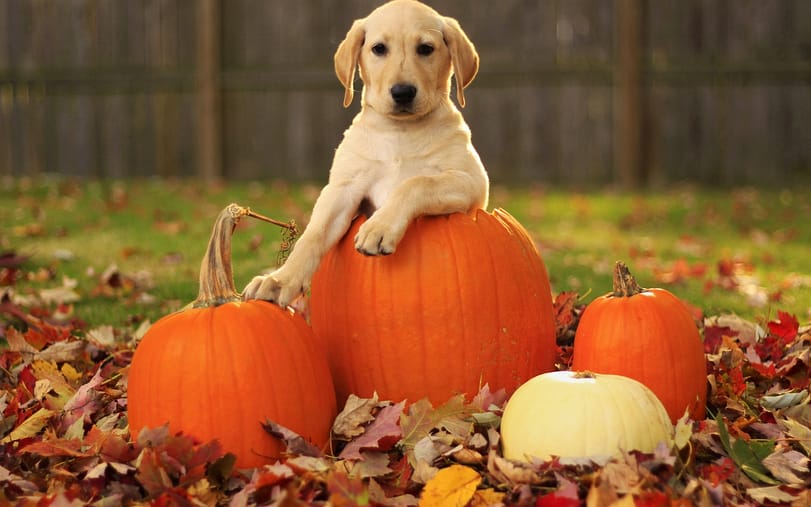
Can Dogs Eat Squash? Squash is a nutritious and delicious vegetable that can be enjoyed by both humans and dogs alike. You may be wondering if it’s safe for your pup to enjoy this tasty treat, and the answer is yes!
Squash can be an excellent addition to your dog’s diet when given in moderation and with caution. Let’s take a closer look at the benefits of feeding your canine companion squash and any potential risks associated with it.
Benefits of Feeding Your Dog Squash
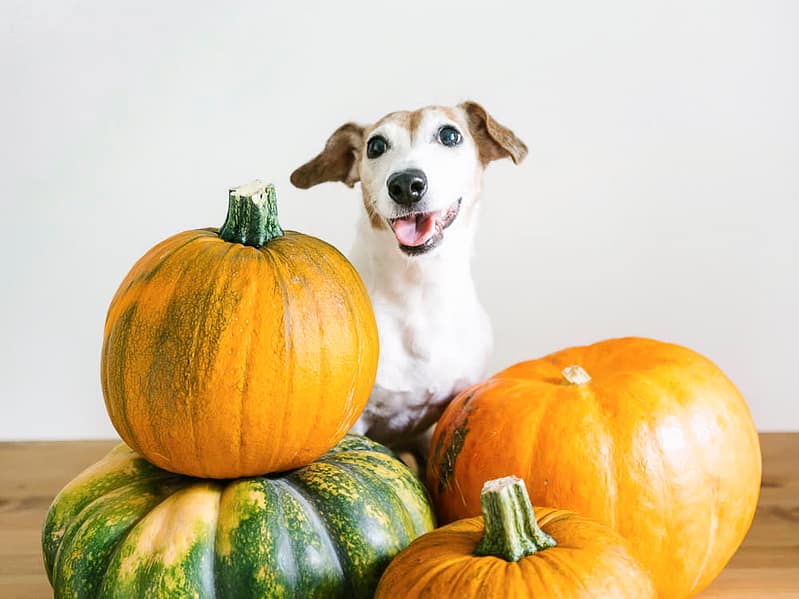
Believe it or not, feeding your pup squash can offer various health benefits – so don’t miss out! Squash is an excellent alternative to other starchy vegetables and can provide your pup with essential vitamins and minerals. However, as with any food, you should exercise moderation when introducing squash into your pet’s diet.
Explore alternatives like sweet potatoes to diversify the nutritional content of their meals. Feeding them squash in small portions can help prevent them from gaining too much weight while providing some of the same benefits as other vegetables.
Squash also contains fiber, which helps support healthy digestion and encourages regular bowel movements. It also has anti-inflammatory properties that could alleviate digestive issues such as irritable bowel syndrome or inflammatory bowel disease.
Additionally, squash is high in antioxidants that may help reduce oxidative stress caused by free radicals in your pet’s body.
Nutritional Value of Squash
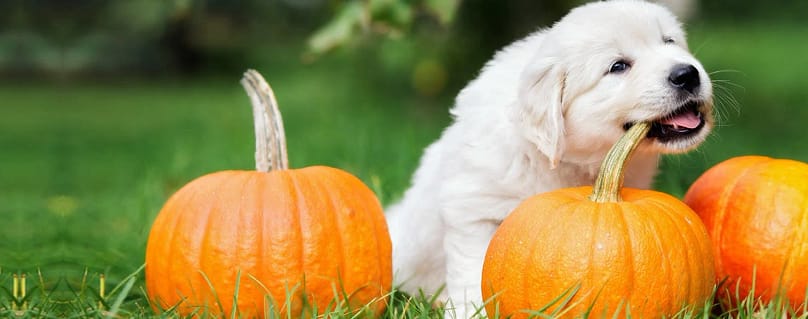
Squash is packed with essential vitamins and minerals that can provide numerous health benefits. It contains various B vitamins, such as folate, niacin, thiamine, and pyridoxine, necessary for metabolism.
Squash also contains a good amount of vitamin A, which helps to keep eyes healthy and improves vision. Additionally, squash is high in dietary fiber, making it an ideal substitute for grains in your dog’s diet.
Squash also contains several minerals, including magnesium, calcium, and potassium which help to regulate the body’s functions. Plus, it is low in calories, so you don’t have to worry about overfeeding your pup when adding it to their meals.
Additionally, squash is an excellent substitute for vegetables like potatoes or carrots if you want to switch up your nutrition intake occasionally.
Best Ways to Introduce Squash to Your Dog’s Diet
Introducing squash to your dog’s diet can be a great way to provide them with essential vitamins and minerals. When introducing it, it’s important to consider whether you should feed it cooked or raw. Also, what portion size would be best for your pup? These two factors will help ensure you’re feeding your dog the healthiest squash possible.
Cooked vs. Raw
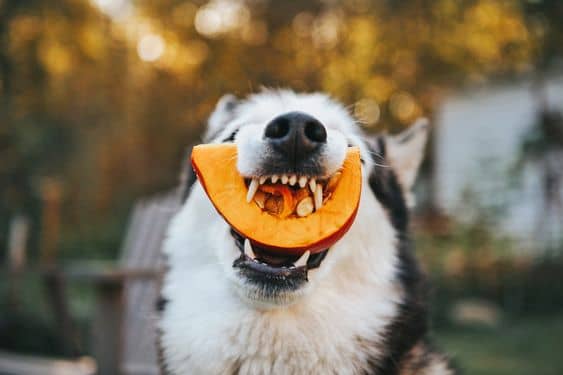
Whether you cook it or eat it raw, squash can make a tasty treat for your pup. Squash is an excellent source of natural vitamins and minerals like vitamins A, C, and E, folate, iron, and fiber. But before adding this delicious vegetable to your dog’s diet, there are some things you need to consider.
First, if you feed your dog cooked squash, ensure it’s well-cooked without any added seasonings like salt or sugar. You can also freeze cooked squash for later use or buy canned squash from the store which has already been cooked and seasoned.
If you feed your pup raw squash, cut it into small cubes so they don’t choke on them. Lastly, continuously monitor their reactions when introducing new foods into their diet, as some dogs may have allergies or sensitivities to certain vegetables and fruits.
Here are some tips to keep in mind when introducing squash to your pup’s diet:
- Cooked squash should be free of added seasoning such as salt and sugar
- Freeze-cooked squash for future use
- Consider buying canned squash from the store if cooking isn’t an option
- Cut raw squash into small cubes before feeding them
Can Dogs eat squash? Understanding Safety and Ideal Portions
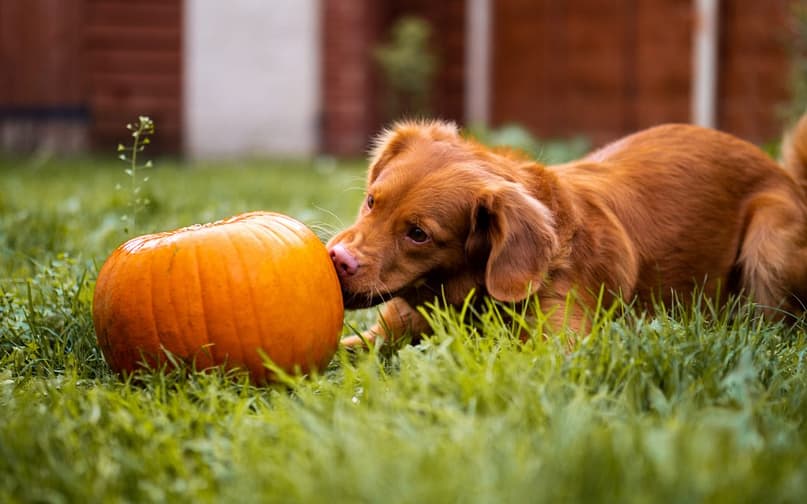
When feeding your pup squash, it’s essential to monitor their portions and adjust accordingly. It’s best to consult your veterinarian about the proper portion size for your dog to ensure they’re getting the right amount of nutrients.
Generally speaking, smaller breeds will need less than larger breeds regarding portion sizes. Feeding guidelines can also be found online or in pet food packages that may provide insight into how much squash is safe for your pup to consume.
It’s important not to overfeed your dog, as too much squash can cause diarrhea or other digestive issues. Start with a small amount of cooked squash and slowly increase it until you find the right balance for your pup. Please pay attention to how your dog responds after eating, and always have fresh water available for them at all times!
Potential Risks of Feeding Squash to Your Dog
Feeding your canine companion squash can come with potential risks, so it’s important to be aware of them. Squash is generally safe for dogs to consume, as long as it is cooked and served in moderation. However, there are some age-related differences that should be taken into account. Puppies should not be fed squash because their digestive systems are still developing and the vegetable can cause them to become constipated or bloated. Older dogs may need fewer carbohydrates than younger ones, so adding a large amount of squash could lead to weight gain or other health problems.
| The way squash is prepared also affects its safety for consumption by dogs. Adding ingredients like butter or oil can add extra calories that your dog doesn’t need and may potentially cause digestion issues if consumed too often. It’s best to serve plain unsalted cooked squash without any added oils or seasonings in order to avoid these potential risks. | Age | Amount |
|---|---|---|
| Puppy | Avoid | |
| Adult | Moderate |
Tips for Incorporating Squash into Your Dog’s Diet
Incorporating squash into your furry friend’s diet can be a nutritious and delicious treat for them to enjoy!
To ensure your pup gets the most out of this snack, it’s important to consider their age when introducing it. If they’re a puppy, start by adding a small amount of cooked squash to their kibble as part of the weaning process. This will help them get used to new flavors and textures while still allowing you to control how much they eat.
As your pup grows older, you can increase the portion size accordingly. Additionally, if your dog is older or has any underlying health conditions, consult with your vet before feeding them squash in order to determine if it’s safe for them.
See Also:
- Purina Dog Chow: The Healthy Choice for Your Canine Companion
- Uncover the Benefits of Mary Ruth’s Probiotic for a Healthy Gut
- Nylabone: Unleash Joyful Chewing and Promote Healthy Teeth with the Ultimate Dog Chew Toy
Conclusion
You’ve learned that squash can be a great addition to your dog’s diet. It provides essential vitamins, minerals, and fiber which can help keep your pup healthy and happy.
Make sure you introduce it slowly and only provide small amounts at first. If you follow these tips, your dog will enjoy the added nutrition of squash without any ill effects.
So go ahead and give it a try! Your pup is sure to love it – plus they’ll be getting all the benefits of this nutritious vegetable treat!
Help Give Shelter Dogs a Second Chance: Support Bone Voyage Dog Rescue Today!
